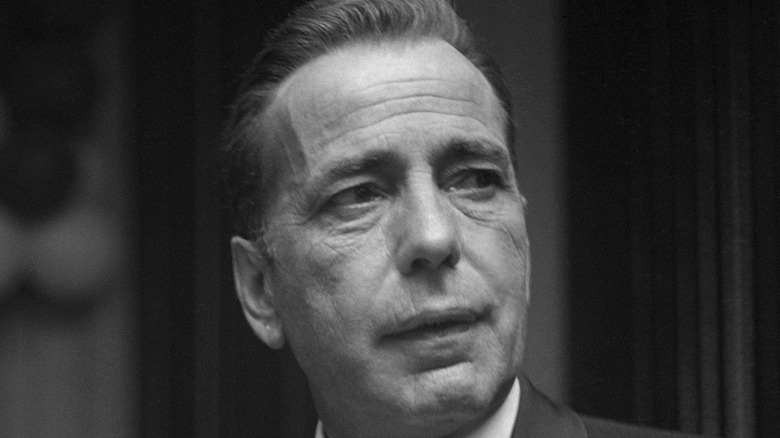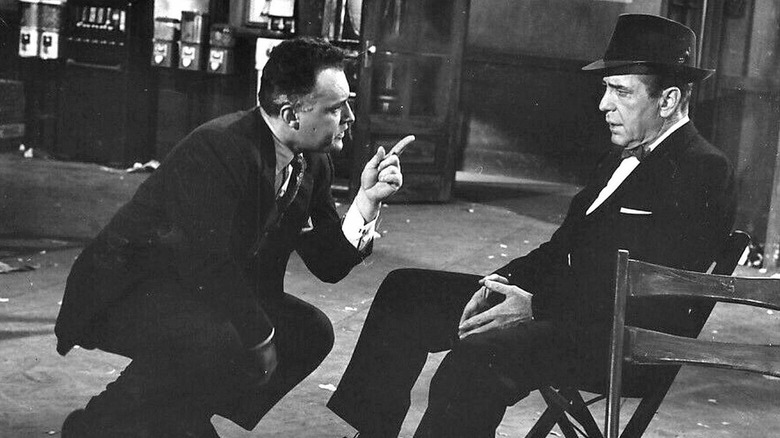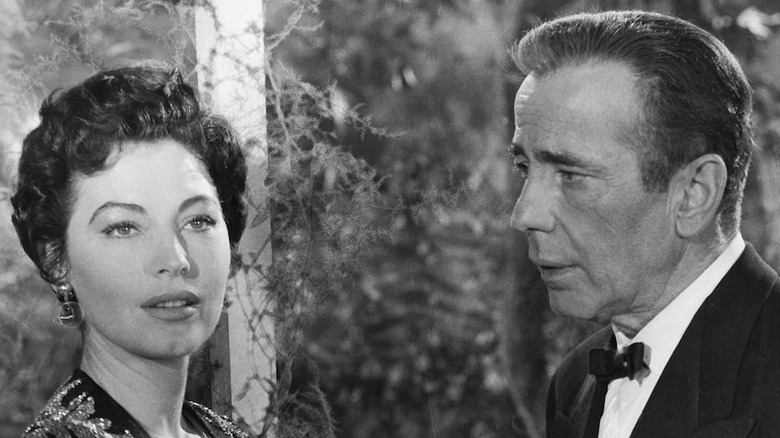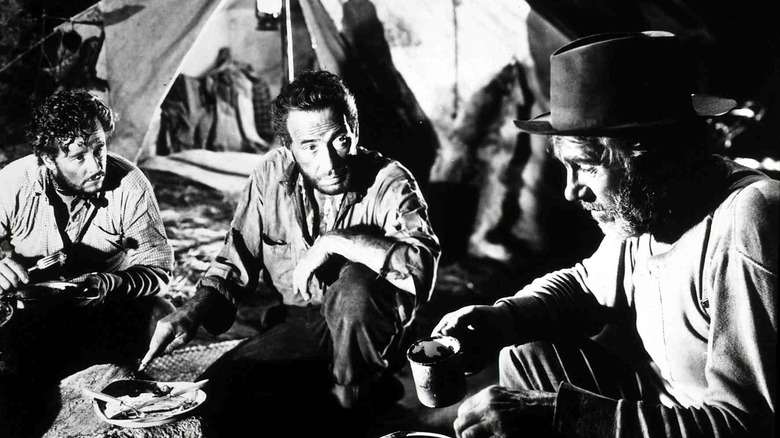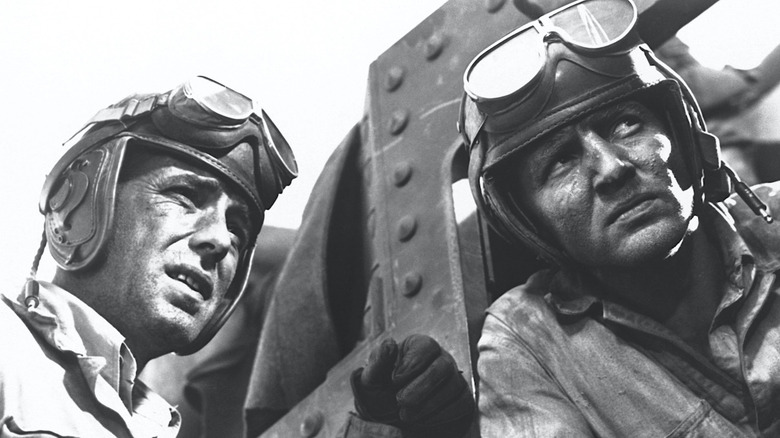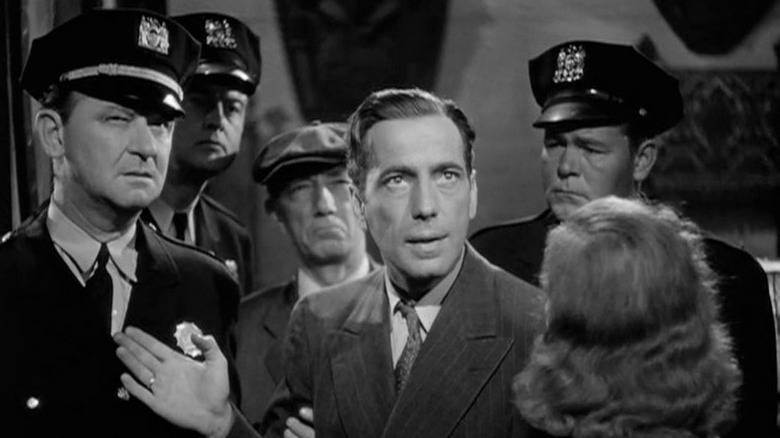Are These Humphrey Bogart's Best Movies?
From nobody to new sensation, B-movies to blockbusters, Humphrey Bogart sports a legacy that Hollywood reveres and treasures to this day. Born on Christmas Day in New York, 1899, Bogart began his performance career in Broadway stage plays and made his acting debut as a Japanese waiter in a production called "Drifting." (The Associated Press reports he had one line.) After transitioning to film, he developed a reputation as the quintessential bad guy, often being the go-to pick for directors seeking a brooding antagonist in projects like "The Great O'Malley" (1937), "Dead End" (1937), "Crime School" (1938) and "King of the Underworld" (1939).
The universality of his acting abilities eventually blossomed into a more 360-degree spectrum as he started to take on different roles and on-screen personas, frequently appearing as a hero/ladies' man in various projects moving forward. He'd go on to star in over 80 films during his lifetime (per Biography). Most Bogart buffs are familiar with major hitters like "Casablanca" and "The Maltese Falcon," but which of his 80+ films are considered his most monumental?
The Harder They Fall (1956)
First, let's start with the last. We all love a good boxing movie, especially one with an edgy twist. "The Harder They Fall" was Humphrey Bogart's last film (he was tragically dying of esophageal cancer during production), but certainly not his least cherished (via Showbiz Cheat Sheet).
Bogart took on the role of Eddie Willis, a newspaper reporter who gets caught up with corrupt boxing promoter Nick Benko (Rod Steiger, above left) and his prized fighter, Toro Moreno (Mike Lane). Caught in the crosshairs of an ethical conundrum, Willis must decide whose corner to stand in — that of the greedy and deceptive Benko, or Moreno's, who is totally oblivious to the tactical manipulation of his overseer. With a 100% score on Rotten Tomatoes and a warm reception from critics and moviegoers alike, the Oscar-nominated "Fall" is indeed a prized fighter in the ring of Bogart films (per Rotten Tomatoes).
The Barefoot Contessa (1954)
Two years prior to the release of "The Harder They Fall," Humphrey Bogart went straight for the heart with Joseph L. Mankiewicz's "The Barefoot Contessa." The distinctive love story tells the tale of director Harry Dawes (Bogart) and his reclamation of stardom after he discovers the lowly but stunning Maria Vargas, played by none other than Hollywood's infinitely radiant Ava Gardner. With its illustrious European settings, risqué dialogue, and supercharged sensual energy, the tragic and seductive "Contessa" was destined to be a hit.
Despite mixed reviews from critics then and now (via The New York Times), it's instilled in the annals of Hollywood history as one of the most prominent projects for both Bogart and Gardner, further proving that the former could hold his own as a romantic symbol as well as a tough guy. At the 1955 Academy Awards, Edmond O' Brien took home the Oscar for Best Supporting Actor for his role as Oscar Muldoon in the film (per IMDb).
The Treasure of the Sierra Madre (1948)
Before "National Treasure," there was "The Treasure of the Sierra Madre." In this classic adventure film, Humphrey Bogart took audiences on a journey beyond the aristocratic gin joints and dingy back alleys that were common settings for most of his other roles. In the gullet of the Sierra Madre mountains (aptly named), Dobbs (Bogart) and his sidekick Curtain (Tim Holt) team up with the ambitious Howard (Walter Huston) in hot pursuit of gold buried deep within the harrowing terrain.
"The Treasure of the Sierra Madre" was exciting and charming deviation from Bogart's presumed norm and was a riveting saga that remains a spectacle for movie lovers today. The film was director and screenwriter John Huston's follow-up project to another Bogart treasure, "The Maltese Falcon," opting to take his crew on an adventure of their own by stepping outside of concocted Hollywood sets and into the actual heart of the Mexican mountains (per Little White Lies). It was nominated for best picture but lost to Laurence Olivier's "Hamlet." John Huston, however, picked up Oscars for direction and writing, and his father, Walter, won best supporting actor. There is little dispute between critics and fans alike that this engrossing odyssey of gold hunters is truly a piece of Hollywood's golden age.
Sahara (1943)
"The Treasure of the Sierra Madre," though likely his most prominent, wasn't actually Humphrey Bogart's only adventure film. Zoltan Korda's 1943 classic "Sahara" was the high-tension, action-packed predecessor to later projects that would represent something different for Bogart.
Set in the Libyan desert, a team of U.S. soldiers find themselves exposed to the desolate and unforgiving landscape in their mission to retrieve a pack of Allied stragglers, all the while racing against barbaric German forces who threaten to get there first. Akin to our generation's highly successful "Fury" (2014), this harrowing war saga spoke to audiences and members of the armed forces on a deeply personal level. The film was released when the country was in the midst of World War II, so it naturally had controversies to accompany its appeals. A few years after its release, Korda and John Howard Lawson were tried before the House Un-American Activities Committee for the story's socialist subtext (per Britannica).
All Through The Night (1942)
When it comes to Humphrey Bogart, there is no last and there is no least, but for our purposes, the last film on our "best of Bogart" list is "All Through The Night." It's truly chalked with everything that makes Bogart the best: mystery, murder, conspiracy, and ... cheesecake?
When his character, Alfred "Gloves" Donahue discovers that — after his cheesecake was never delivered — his local baker has been murdered, things spiral into a flurry of accusation, investigation, and deputation (of Nazis, that is. Yes, there are Nazis, too). Humphrey Bogart stars alongside Katherine Verne, Conrad Veidt, and Peter Lorre ("Casablanca") in this 1942 noir masterpiece that incorporates a myriad of genres into one mind-spinning, tongue-in-cheek cyclone of excellence and humor. Producer Hal Wallis originally had newspaper columnist Walter Winchell in mind for the role as Alfred Donahue, but the writer couldn't make time to star in the film. George Raft then turned it down, and despite being the project's third choice, Humphrey Bogart stepped in and made "All Through The Night" one of his and Hollywood's most celebrated movies (via Turner Classic Movies).
